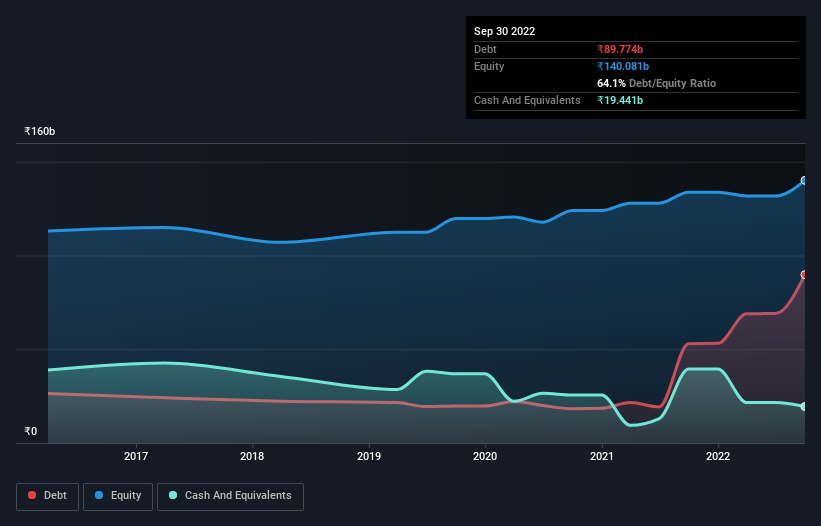David Iben put it well when he said, 'Volatility is not a risk we care about. What we care about is avoiding the permanent loss of capital.' It's only natural to consider a company's balance sheet when you examine how risky it is, since debt is often involved when a business collapses. Importantly, SJVN Limited (NSE:SJVN) does carry debt. But is this debt a concern to shareholders?
When Is Debt A Problem?
Debt is a tool to help businesses grow, but if a business is incapable of paying off its lenders, then it exists at their mercy. In the worst case scenario, a company can go bankrupt if it cannot pay its creditors. However, a more common (but still painful) scenario is that it has to raise new equity capital at a low price, thus permanently diluting shareholders. By replacing dilution, though, debt can be an extremely good tool for businesses that need capital to invest in growth at high rates of return. The first step when considering a company's debt levels is to consider its cash and debt together.
See our latest analysis for SJVN
What Is SJVN's Net Debt?
You can click the graphic below for the historical numbers, but it shows that as of September 2022 SJVN had ₹89.8b of debt, an increase on ₹53.0b, over one year. However, it also had ₹19.4b in cash, and so its net debt is ₹70.3b.

How Strong Is SJVN's Balance Sheet?
Zooming in on the latest balance sheet data, we can see that SJVN had liabilities of ₹27.5b due within 12 months and liabilities of ₹95.2b due beyond that. On the other hand, it had cash of ₹19.4b and ₹9.86b worth of receivables due within a year. So its liabilities outweigh the sum of its cash and (near-term) receivables by ₹93.4b.
This deficit is considerable relative to its market capitalization of ₹134.6b, so it does suggest shareholders should keep an eye on SJVN's use of debt. Should its lenders demand that it shore up the balance sheet, shareholders would likely face severe dilution.
We use two main ratios to inform us about debt levels relative to earnings. The first is net debt divided by earnings before interest, tax, depreciation, and amortization (EBITDA), while the second is how many times its earnings before interest and tax (EBIT) covers its interest expense (or its interest cover, for short). This way, we consider both the absolute quantum of the debt, as well as the interest rates paid on it.
SJVN has net debt to EBITDA of 3.3 suggesting it uses a fair bit of leverage to boost returns. But the high interest coverage of 8.9 suggests it can easily service that debt. Also relevant is that SJVN has grown its EBIT by a very respectable 20% in the last year, thus enhancing its ability to pay down debt. When analysing debt levels, the balance sheet is the obvious place to start. But ultimately the future profitability of the business will decide if SJVN can strengthen its balance sheet over time. So if you want to see what the professionals think, you might find this free report on analyst profit forecasts to be interesting.
But our final consideration is also important, because a company cannot pay debt with paper profits; it needs cold hard cash. So the logical step is to look at the proportion of that EBIT that is matched by actual free cash flow. Over the last three years, SJVN saw substantial negative free cash flow, in total. While that may be a result of expenditure for growth, it does make the debt far more risky.
Our View
SJVN's conversion of EBIT to free cash flow was a real negative on this analysis, although the other factors we considered cast it in a significantly better light. For example its EBIT growth rate was refreshing. It's also worth noting that SJVN is in the Electric Utilities industry, which is often considered to be quite defensive. Taking the abovementioned factors together we do think SJVN's debt poses some risks to the business. While that debt can boost returns, we think the company has enough leverage now. There's no doubt that we learn most about debt from the balance sheet. However, not all investment risk resides within the balance sheet - far from it. Be aware that SJVN is showing 3 warning signs in our investment analysis , and 1 of those is significant...
Of course, if you're the type of investor who prefers buying stocks without the burden of debt, then don't hesitate to discover our exclusive list of net cash growth stocks, today.
New: Manage All Your Stock Portfolios in One Place
We've created the ultimate portfolio companion for stock investors, and it's free.
• Connect an unlimited number of Portfolios and see your total in one currency
• Be alerted to new Warning Signs or Risks via email or mobile
• Track the Fair Value of your stocks
Have feedback on this article? Concerned about the content? Get in touch with us directly. Alternatively, email editorial-team (at) simplywallst.com.
This article by Simply Wall St is general in nature. We provide commentary based on historical data and analyst forecasts only using an unbiased methodology and our articles are not intended to be financial advice. It does not constitute a recommendation to buy or sell any stock, and does not take account of your objectives, or your financial situation. We aim to bring you long-term focused analysis driven by fundamental data. Note that our analysis may not factor in the latest price-sensitive company announcements or qualitative material. Simply Wall St has no position in any stocks mentioned.
About NSEI:SJVN
SJVN
Engages in the generation and sale of electricity in India and internationally.
High growth potential average dividend payer.
Similar Companies
Market Insights
Community Narratives





